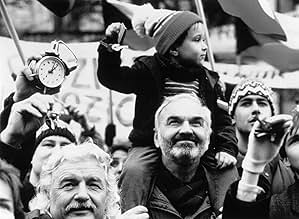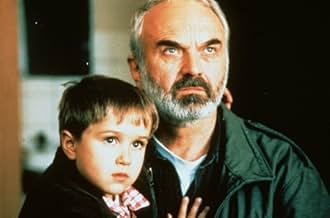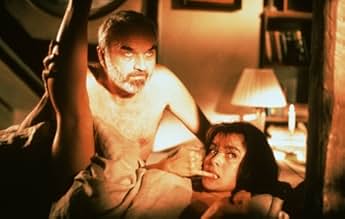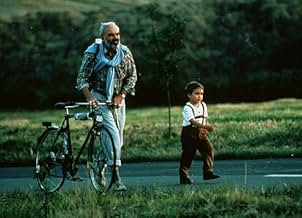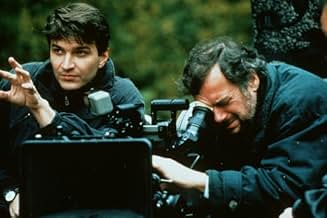NOTE IMDb
7,7/10
17 k
MA NOTE
Un célibataire endurci a la surprise de sa vie lorsqu'un plan d'enrichissement rapide se retourne contre lui et le laisse avec un nouveau colocataire de la taille d'un pingouin.Un célibataire endurci a la surprise de sa vie lorsqu'un plan d'enrichissement rapide se retourne contre lui et le laisse avec un nouveau colocataire de la taille d'un pingouin.Un célibataire endurci a la surprise de sa vie lorsqu'un plan d'enrichissement rapide se retourne contre lui et le laisse avec un nouveau colocataire de la taille d'un pingouin.
- Réalisation
- Scénario
- Casting principal
- Récompensé par 1 Oscar
- 21 victoires et 14 nominations au total
Zdenek Sverák
- Louka
- (as Zdeněk Svěrák)
Andrey Khalimon
- Kolja
- (as Andrej Chalimon)
Irina Bezrukova
- Nadezda
- (as Irina Livanova)
Liliyan Malkina
- Tamara
- (as Lilian Malkina)
Nela Boudová
- Brozová
- (as Nella Boudová)
Avis à la une
This is a variation on the theme of an older man whose emotional life is reawakened by his being thrust into unexpected parenting of a young child. Many have complained of the exploitation of such time-worn subject matter, but the worth of "Kolya" lies in the particulars of how its themes are developed. After all there are still good movies made about underdog sports teams prevailing, and even the exact same material (thinking Shakespeare here) can be made fresh through different productions.
The man in question here is Frantisek Louka, the place is the Czech Republic, and the time is 1988 (just prior to the "Velvet Revolution"). Financial constraints tempt Louka to enter into a bargain to marry a Russian woman so she can get Czech citizenship and, it turns out, escape to West Germany to be with her lover. This leaves Louka to care for the child "Kolya." One thing that makes this movie stand out is the quality of the acting by all involved. In particular Andrei Chalimon as the Russian child is very natural and will win your heart as he does Louka's. But it's a slow process.
Another thing that sets this off is the political backdrop. I knew about Russia's occupation of the Czech Republic after World War II and the non-violent overthrow of the Communist government in 1989, but that is about as far as my knowledge went. This movie portrays what it was like to live in that environment in a concrete way that a history book cannot. A lot of little scenes exemplify the underlying tensions, such as Louka's being expected to display both the Czech and Russian flags in his window, Louka's mother refusing to let some Russian soldiers in to wash their hands by lying about her having no water, and Louka's purposeful refusal to learn the Russian language. So, this movie provided a small increment in my knowledge of Czech history and that's better than nothing. How the political situation drives the action makes for a singularly interesting story.
The musical score that contains works by the Czech composers Dvořák, Suk, Fibich, and Smetana adds a special quality.
Don't be turned away from seeing this because it touches on familiar themes; it is a quality film with unique characteristics.
The man in question here is Frantisek Louka, the place is the Czech Republic, and the time is 1988 (just prior to the "Velvet Revolution"). Financial constraints tempt Louka to enter into a bargain to marry a Russian woman so she can get Czech citizenship and, it turns out, escape to West Germany to be with her lover. This leaves Louka to care for the child "Kolya." One thing that makes this movie stand out is the quality of the acting by all involved. In particular Andrei Chalimon as the Russian child is very natural and will win your heart as he does Louka's. But it's a slow process.
Another thing that sets this off is the political backdrop. I knew about Russia's occupation of the Czech Republic after World War II and the non-violent overthrow of the Communist government in 1989, but that is about as far as my knowledge went. This movie portrays what it was like to live in that environment in a concrete way that a history book cannot. A lot of little scenes exemplify the underlying tensions, such as Louka's being expected to display both the Czech and Russian flags in his window, Louka's mother refusing to let some Russian soldiers in to wash their hands by lying about her having no water, and Louka's purposeful refusal to learn the Russian language. So, this movie provided a small increment in my knowledge of Czech history and that's better than nothing. How the political situation drives the action makes for a singularly interesting story.
The musical score that contains works by the Czech composers Dvořák, Suk, Fibich, and Smetana adds a special quality.
Don't be turned away from seeing this because it touches on familiar themes; it is a quality film with unique characteristics.
What is a man to do who has resisted marriage until late middle age but then enters into a fraudulent marriage of convenience and ends up solely responsible for a five year old in the bargain? That is Franta Louka's dilemma in this beautiful film.
Louka, played by Zdenek Sverak who also wrote the screenplay, is a onetime philharmonic cellist who has lost his orchestra job because the Soviet era Czech communist powers-that-be deem him unreliable. As a consequence Louka has been reduced to playing at weddings and funerals and re-gilding cemetery tombstones. He has no car and is deeply in debt. In order to finance a car and reduce his debt Louka lets a coworker from the cemetery convince him to marry a Russian woman so that she can emigrate to the West. Louka reluctantly agrees and married the woman but the Russian decamps. This ultimately results in Louka becoming solely responsible for the woman's five year old boy -- who only speaks Russian.
Louka and the little boy's relationship is both believable and moving. "Kolya" is very nearly a great film. Highly, highly recommended. 9 out of 10.
Louka, played by Zdenek Sverak who also wrote the screenplay, is a onetime philharmonic cellist who has lost his orchestra job because the Soviet era Czech communist powers-that-be deem him unreliable. As a consequence Louka has been reduced to playing at weddings and funerals and re-gilding cemetery tombstones. He has no car and is deeply in debt. In order to finance a car and reduce his debt Louka lets a coworker from the cemetery convince him to marry a Russian woman so that she can emigrate to the West. Louka reluctantly agrees and married the woman but the Russian decamps. This ultimately results in Louka becoming solely responsible for the woman's five year old boy -- who only speaks Russian.
Louka and the little boy's relationship is both believable and moving. "Kolya" is very nearly a great film. Highly, highly recommended. 9 out of 10.
8=G=
"Kolya", an award winning Czech film set in Prague, is a sweet and sentimental story about a boy (the title character) and a male cellist who, through circumstance, becomes his guardian. Set against a backdrop of Czech countryside and the architecture of Prague, this well crafted and wistful tale is a worthwhile 100 minute watch for those in need of relief from the numbing excesses of Hollywood blockbusters. Potentially enjoyable by all, "Kolya" will be most appreciated by mature audiences, particularly those who favor European films.
Take the old formula of two mismatched people being forced to live together, and rejuvenate it by losing the cliches and adding excellent script and direction, and utterly superb acting by all the cast, especially the two leads (the grouch and the boy). The characterisations are just spot on.
Whenever I see films like this I end up both very glad to have seen such an outstanding movie, and extremely irritated that practically no-one knows about this gem of a movie, yet films like 'Godzilla' rake in money.
My thanks to all involved with this movie; you have produced a work of art.
Whenever I see films like this I end up both very glad to have seen such an outstanding movie, and extremely irritated that practically no-one knows about this gem of a movie, yet films like 'Godzilla' rake in money.
My thanks to all involved with this movie; you have produced a work of art.
10CBW-2
I did not think this film was at all sentimental (if you are using the word in its pejorative sense). In reading the comments on this film, I noticed the Czechs who responded were rather lukewarm about it. This surprises me. Kolya works as a film on several levels at once -- political, artistic, personal, etc. and I do not think it is at all predictable. The performances are magical and the entire film is encased by music of very great beauty and humanity by Dvorak and other great Czech composers. Music from Dvorak's "Four Biblical Songs" is at the heart of the film. It is the song that Klara sings at the funerals and the song Kolya is singing before and during the closing credits. The vintage film footage of Kubelik conducting Smetana's Ma Vlast at a concert at the end of the Russian occupation is a wonderful touch. Although I'm sure many other Czech films deserve Oscars, I am glad Kolya was recognized. I hope this film is released on DVD soon.
Le saviez-vous
- AnecdotesThe child actor who plays Kolja, Andrey Khalimon, was not cast until three weeks before filming started.
- GaffesThroughout the movie, many background cars are clearly newer than 1989 models. The film is set in 1989.
- ConnexionsFeatured in 54th Golden Globe Awards (1997)
Meilleurs choix
Connectez-vous pour évaluer et suivre la liste de favoris afin de recevoir des recommandations personnalisées
- How long is Kolya?Alimenté par Alexa
Détails
- Date de sortie
- Pays d’origine
- Site officiel
- Langues
- Aussi connu sous le nom de
- Коля
- Lieux de tournage
- Sociétés de production
- Voir plus de crédits d'entreprise sur IMDbPro
Box-office
- Montant brut aux États-Unis et au Canada
- 5 770 254 $US
- Montant brut mondial
- 5 770 254 $US
- Durée
- 1h 51min(111 min)
- Couleur
- Mixage
- Rapport de forme
- 1.66 : 1
Contribuer à cette page
Suggérer une modification ou ajouter du contenu manquant


